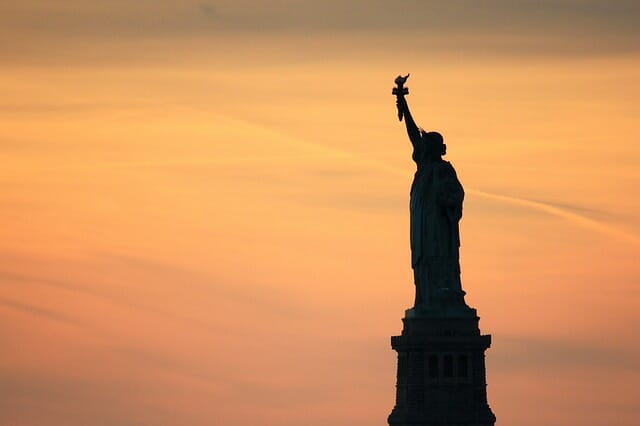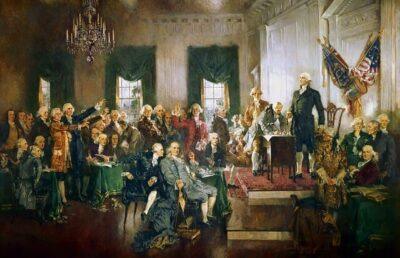“Boy: It’s not easy to become a law, is it?”
Bill: “No!”
—Dave Frishberg, Schoolhouse Rock, “I’m Just a Bill” (1975)
“But what is government itself, but the greatest of all reflections on human nature? If men were angels, no government would be necessary.”
—James Madison, The Federalist Papers, No. 51 (1788)
Defining Our Terms
Sometimes ignorantly, sometimes with deliberate malice … politicians, educators, and media wonks speak of the United States as a democracy. It isn’t. It never has been. It was never supposed to be. The truth is … it’s supposed to be a republic. It’s always been. However, to understand why, we must first look at basic definitions.
First, in a pure democracy, like those of supposed ancient Greece, citizens gather together in a single place, discuss matters of state, and then vote to establish or alter law and policy. When the vote is taken, 50 percent plus one carries the day. Because democracies require all voting citizens to meet together, democracies are traditionally small or the number of those who have the right to vote is extremely limited. At some point you should ask yourself if a democracy is still a democracy if only a few can vote.
Athens, for example, during the 3rd century had a population of close to 300,000 yet had only 30,000 (or fewer) voting citizens, all adult men. Hardly our concept of a democracy. In fact, some historians now believe it may have been closer to 5,000 adult men that actually voted. Think of it … 5,000 voting for the 300,000.
In a republic, representatives are chosen by the people, or by some portion of them. Those representatives meet together and vote to establish or alter law and policy. The percentage of yay votes required to carry the day may vary considerably depending upon the sort of law or policy under consideration. Percentages also vary widely from one republic to another. But with the idea of stability in mind, the creation or alteration of laws needs to be difficult but possible.
Traditionally, republics move in terms of certain fixed and written laws that can’t be changed easily or that can only be changed with quite a bit of effort. Conversely, democracies can, theoretically, change their most basic operating principles with a single majority vote. For this reason, republics tend to be more stable and long-lived than democracies.
Turn Drive Time Into Fun-Filled, History Time With Your Kids!
Like the Pilgrims and the Puritans, the framers of our Constitution were extremely suspicious of democracies. Many of the framers openly denounced democracies as dangerous and unworkable. In the 10th of the Federalist Papers, James Madison took some pains to show the superiority of republics to democracies generally, and the superiority of a confederated republic, such as our own, to both. He discussed these differences in terms of “faction.”
The Problem of Factions
The roots of the concept of faction are in man’s sin. Fallen man is by nature selfish and self-serving. We will routinely sacrifice the well-being of the community, now or in its future, for what we perceive to be our own present benefit. We will do this in the name of love, social justice, or sometimes calling our own gain … the common good. We will express moral horror that anyone should oppose our factious agenda. Liberals do this all the time, issuing proposals that, on the surface, seem kind, good, and loving.
Given this common “fallen” human state and our tendency to give into the temptations of power and money, the framers of our Constitution designed our federal system to mitigate and control the results of faction rather than its roots. And so, Madison tells us that if a faction is a minority, the “republican principle . . . enables the majority to defeat its sinister views by regular vote.” A small but vigorous faction may “clog the administration, it may convulse the society; but it will be unable to execute and mask its violence under the forms of the Constitution.”
The much greater problem, of course, comes when a faction represents a majority. In a democracy, the vote of 50 percent plus one can overrule both the public good and the rights of the minority. But how can a republic fare any better? This is the issue that Madison addresses at length.
Madison argues that there are only two ways to check the evils of a majority faction:
- Either the majority must be kept from being obsessed by the same foolishness at the same time,
- The majority must be left without the ability to act quickly on that foolishness.
Pure democracy can accomplish neither of these. When the votes in a democracy get together and listen to the same rousing speakers at the same time, the majority will often be moved by “a common passion or interest,” and “there is nothing to check the inducements to sacrifice the weaker party or an obnoxious individual.”
And so, “such democracies have ever been spectacles of turbulence and contention; have ever been found incompatible with personal security or the rights of property; and have in general been as short in their lives as they have been violent in their deaths.”
A republic, on the other hand, functions through representation:
- It delegates the business of government to “a small number of citizens elected by the rest.”
- And because of this, a republic can contain greater number of citizens than a democracy and encompass a much larger territory.
Representation may give us leaders who are truly committed to the best interests of the country. But Madison was far from optimistic on this count. He saw no guarantee that wisdom, patriotism, and love of justice would be the rule for elected officials. He recognized, rather, that “men of factious tempers, of local prejudices, or of sinister designs, may, by intrigue, by corruption, or by other means, first obtain the [votes], and then betray the interests, of the people.”
The question then is this: Will small republics or larger ones be most favorable to the election of good rulers? Madison actually argues for larger republics. He gives two reasons. First, a larger republic will supply more fit candidates for office. Second, each candidate will have to please more voters, and more types of voters, to be elected.
And, as Madison argued, the greater number of citizens and extent of territory that a republic will normally encompass will increase these advantages. A republic will include “a greater variety of parties and interests,” making it less probable that “a majority of the whole will have a common motive to invade the rights of other citizens.” Or, if such a common motive exists, a republican form of government will make it more difficult for all who are caught up in the same dangerous passion to act in unison.
To this point, Madison, writing in the Federalist Papers, had been comparing the workings of a democracy to those of a simple republic. Next, he goes on to discuss the even greater advantages that belong to a confederate republic — to the republican union of several smaller republics. As you might expect, he has our own republic in view.
Heirloom Audio: Putting God Back Into History
Madison argues that the federal Union created by the Constitution amplifies all the advantages of a simple republic. It replaces the rule of the easily swayed crowd with the wisdom and skill of representatives who (we hope) can see beyond the storm of local politics and prejudices. It includes an even greater number of parties and points of view and so makes a majority faction less likely. And when these protections fail, our federal structure would make it difficult for majority factions to form in the first place, or having formed, to accomplish their purposes easily or quickly.
Within our federal Union, candidates still have to please a lot of different folks to get elected and to stay in office. Those with dangerous and radical ideas probably won’t make it into office. Madison didn’t think there would be enough radical citizens to vote them into office.
Legislative foolishness that springs up in one corner of the country may quickly win followers there, but it will take time for that same foolishness to win support in all the other states. And even when political foolishness has a lot of immediate support across the country, it still must be transformed into one or more bills that must make their way through the legislative process.
That means a majority vote in both houses of Congress and the President’s signature. Federal officials who have a long view of politics, let alone those who are committed to statesmanship, can stall and drag their feet while temporary enthusiasm dies out and support dwindles. Attempts to alter the Constitution itself face even great challenges that take many more months, if not years, to overcome. (Remember the ERA?) Such are the advantages of American federalism.
Conclusion
Of course, no form of civil government can force evil people to act righteously. No forms, no structure or procedures can keep a people who have their hearts set on folly from turning that folly into legislation. The truth is, some forms of political order slow down evil better than others. Our Founders felt democracy, by its very nature, contributed to the folly problem rather than mitigating against it.
 Off The Grid News Better Ideas For Off The Grid Living
Off The Grid News Better Ideas For Off The Grid Living







